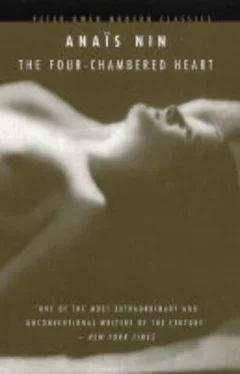Anaïs Nin - The Four-Chambered Heart
Здесь есть возможность читать онлайн «Anaïs Nin - The Four-Chambered Heart» весь текст электронной книги совершенно бесплатно (целиком полную версию без сокращений). В некоторых случаях можно слушать аудио, скачать через торрент в формате fb2 и присутствует краткое содержание. Год выпуска: 2004, ISBN: 2004, Издательство: Peter Owen Limited, Жанр: Классическая проза, Эротические любовные романы, на английском языке. Описание произведения, (предисловие) а так же отзывы посетителей доступны на портале библиотеки ЛибКат.
- Название:The Four-Chambered Heart
- Автор:
- Издательство:Peter Owen Limited
- Жанр:
- Год:2004
- ISBN:9780720611557
- Рейтинг книги:3 / 5. Голосов: 1
-
Избранное:Добавить в избранное
- Отзывы:
-
Ваша оценка:
- 60
- 1
- 2
- 3
- 4
- 5
The Four-Chambered Heart: краткое содержание, описание и аннотация
Предлагаем к чтению аннотацию, описание, краткое содержание или предисловие (зависит от того, что написал сам автор книги «The Four-Chambered Heart»). Если вы не нашли необходимую информацию о книге — напишите в комментариях, мы постараемся отыскать её.
The Four-Chambered Heart — читать онлайн бесплатно полную книгу (весь текст) целиком
Ниже представлен текст книги, разбитый по страницам. Система сохранения места последней прочитанной страницы, позволяет с удобством читать онлайн бесплатно книгу «The Four-Chambered Heart», без необходимости каждый раз заново искать на чём Вы остановились. Поставьте закладку, и сможете в любой момент перейти на страницу, на которой закончили чтение.
Интервал:
Закладка:
“The Mayan Indian is not a mystic, he is a pantheist. The earth is his mother. He has only one word for both mother and earth. When an Indian died they put real food in his tomb, and they kept feeding him.”
“A symbolical food does not taste as good as real food!”
(It is because he is of the earth that he is jealous and possessive. His angers are of the earth. His massive body is of the earth. His knees are of iron, so strong from pressing against the flanks of wild horses. His body has he flavors of the earth: spices, ginger, chutney, musk, pimiento, wine, opium. He has the smooth neck of a statue, a Spanish arrogance of the head, an Indian submission, too. He has the awkward grace of an animal. His hands and feet are more like paws. When he catches a fleeing cat he is swifter than the cat. He squats like an Indian and then leaps on powerful legs. I love the way his high cheekbones swell with laughter. Asleep he shows the luxuriant charcoal eyelashes of a woman. The nose so round and jovial; everything powerful and sensual except his mouth. His mouth is small and timid.)
What Djuna believed was that like a volcano his fire and strength would erupt and bring freedom, to him and to her. She believed the fire in him would burn all the chains which bound him. But fire too must have direction. His fire was blind. But she was not blind. She would help him.
In spite of his physical vitality, he was helpless, he was bound and tangled. He could set fire to a room and destroy, but he could not build as yet. He was bound and blind as nature is. His hands could break what he held out of strength, a strength he could not measure, but he could not build. His inner chaos was the chain around his body, his conviction that one was born a slave of one’s nature, to be led inevitably to destruction by one’s blind impulses.
“What do you want your life to be?”
“A revolution every day.”
“Why, Rango?”
“I love violence. I want to serve ideas with my body.”
“Men die every day for ideas which betray them, for leaders who betray them, for false ideals.”
“But love betrays, too,” said Rango. “I have no faith.”
(Oh, god, thought Djuna, will I have the strength to win this battle against destruction, this private battle for a human love?)
“I need independence,” said Rango, “as a wild horse needs it. I can’t harness myself to anything. I can’t accept any discipline. Discipline discourages me.”
Even asleep his body was restless, heavy, feverish. He threw off all the blankets, lay naked, and by morning the bed seemed like a battlefield. So many combats he had waged within his dreams; so tumultuous a life even in sleep.
Chaos all around him, his clothes always torn, his books soiled, his papers lost. His personal belongings, of which he remembered an object now and then which he missed, wanted to show Djuna, were scattered all over the world, in rooming-house cellars where they were kept as hostages for unpaid rent.
All the little flames burning in him at once, except the wise one of the holy ghost.
It saddened Djuna that Rango was so eager to go to war, to fight for his ideas, to die for them. It seemed to her that he was ready to live and die for emotional errors as women did, but that like most men he did not call them emotional errors; he called them history, philosophy, metaphysics, science. Her feminine self was sad and smiled, too, at this game of endowing personal and emotional beliefs with the dignity of impersonal names. She smiled at this as men smile at women’s enlargement of personal tragedies to a status men do not believe applicable to personal lives.
While Rango took the side of wars and revolutions, she took the side of Rango, she took the side of love.
Parties changed every day, philosophies and science changed, but for Djuna human love alone continued. Great changes in the maps of the world, but none in this need of human love, this tragedy of human love swinging between illusion and human life, sometimes breaking at the dangerous passageway between illusion and human life, sometimes breaking altogether. But love itself as continuous as life.
She smiled at man’s great need to build cities when it was so much harder to build relationships, his need to conquer countries when it was so much harder to conquer one heart, to satisfy a child, to create a perfect human life. Man’s need to invent, to circumnavigate space when it is so much harder to overcome space between human beings, man’s need to organize systems of philosophy when it was so much harder to understand one human being, and when the greatest depths of human character lay but half explored.
“I must go to war,” he said. “I must act. I must serve a cause.”
Rango gave her the feeling of one who reproduced in life gestures and scenes and atmosphere already imprinted on her memory. Where had she already seen Rango on horseback, wearing white fur boots, furs and corduroys, Rango with his burning eyes, somber face, and wild black hair?
Where had she already seen Rango’s face in passion worshipful like a man receiving communion, the profane wafer on the tongue?
Seeing him lying at her side was like one of those memories which assail one while traveling through foreign lands to which one was not bound in any conscious way, and yet at each step recognizing its familiarity, with an exact prescience of the scene awaiting one around the corner of the street.
Memory, or race memories, or the influence of tales, fairy tales, legends, and ballads heard in childhood?
Rango came from sixteenth-century Spain, the Spain of the troubadours, with its severity, its rigid form, the domination of the church, the claustration of women, the splendor of Catholic ceremonies, and a vast, secret tumultuous river of sensuality running below the surface, uncontrollable, and detectable only through those persistent displays of guilt and atonement common to all races.
Rango recreated for Djuna a natural blood-and-flesh paradise so different from the artificial paradises created in art by city children. In her childhood spent in cities, and not in forests, she had created paradises of her own inventions, with a language of her own, outside and beyond life, as certain birds create a nest in some inaccessible branch of a tree, inaccessible to disaster but also difficult to preserve.
But Rango’s paradise was an artless paradise of life in a forest, in mountains, lakes, mirages, with strange animals and strange flowers and trees, all of it warm and accessible.
Because she had been a child of the cities, the paradise of her childhood had been born of fairy tales, legends, and mythology, obscuring ugliness, cramped rooms, miserly backyards.
Rango had had no need to invent. He had possessed mountains of legendary magnificence, lakes of fantastic proportions, extraordinary animals, a house of great beauty. He had known fiestas which lasted for a week, carnivals, orgies. He had taken his ecstasies from the rarefied air of heights, his drugs from religious ceremonies, his physical pleasures from battles, his poetry from solitude, his music from Indian dances, and been nourished on tales told by his Indian nurse.
To visit the first girl he had loved he had had to travel all night on horseback, he had leaped walls, and risked her mother’s fury and possible death at the hands of her father. It was all written in the Romancero !
The paradise of her childhood was under a library table covered to the ground by a red cloth with fringes, which was her house, in which she read forbidden books from her father’s vast library. She had been given a little piece of oilcloth on which she wiped her feet ostentatiously before entering this tent, this Eskimo hut, this African mud house, this realm of the myth.
Читать дальшеИнтервал:
Закладка:
Похожие книги на «The Four-Chambered Heart»
Представляем Вашему вниманию похожие книги на «The Four-Chambered Heart» списком для выбора. Мы отобрали схожую по названию и смыслу литературу в надежде предоставить читателям больше вариантов отыскать новые, интересные, ещё непрочитанные произведения.
Обсуждение, отзывы о книге «The Four-Chambered Heart» и просто собственные мнения читателей. Оставьте ваши комментарии, напишите, что Вы думаете о произведении, его смысле или главных героях. Укажите что конкретно понравилось, а что нет, и почему Вы так считаете.












